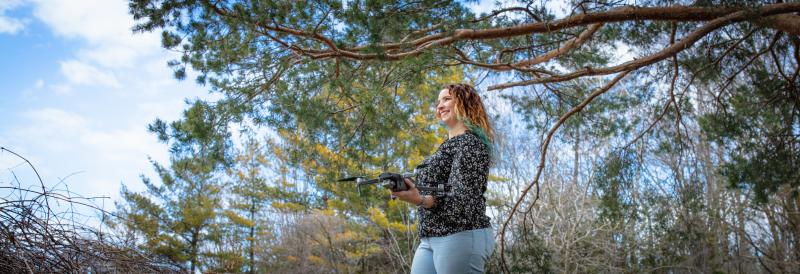Allison Neuhauser

Program
Why did you choose to complete your graduate studies in your program at the University of Guelph?
I'm from southern Ontario (London) but lived in Thunder Bay for eight years. I have always been interested in landscape architecture and designing outdoor spaces, but wasn't sure how someone became a landscape architect, at first. I discovered that there were a number of master's degrees in Landscape Architecture and I chose to study at the University of Guelph to allow myself to be closer to family and friends, I was also interested in living in a smaller city, compared to Vancouver or Winnipeg. As a GIS/mapping project coordinator, I felt I was missing something from my career, and I now think that Landscape Architecture is the right career path for me!
A bit about your path...
One of my biggest supporters is my husband, Kane. When I told him I was thinking about applying, he said "I'm surprised you haven't yet." I told him I didn't want to make this decision for both of us, but he knew I really wanted to go back to school, so he kept nudging me to eventually apply. I also wouldn't be where I am without my parents' support - family is everything, blood or chosen. My parents raised me to believe I can do anything I want to, if I apply myself. I also learned it's okay to make mistakes, and how to fix them. My former boss, Ed, in Thunder Bay was adamant about family coming first, and there were no hard feelings when I left to go back to school. He has since passed on and his death hit me to the core. He taught be to keep going, even if it was difficult, but also to only keep going if it is important to you.
A bit about the work you did at U of G...
I explored new and emerging technologies in Landscape Architecture, mainly drones or Remotely Piloted Aircraft Systems (RPAS). Also called Unmanned Aerial Vehicles (UAVs), drones have a lot of untapped potential in Landscape Architecture. I did some work with drones on the ice road network in Northern Ontario and using drones allowed me and the engineers I was working with to get a bird's-eye-view of the land to reroute portions of the ice road. I already had my drone pilot's operator certificate so I thought pursuing this area of research made sense.
Like most people in my cohort, I 'stumbled' onto Landscape Architecture by looking into a possible career change. I think I was on the American Society of Landscape Architects' (ASLA) website when I first read the words 'Landscape Architecture' and the description of the career seemed to really fit my interests in improving the environment and doing so in a creative way.
Please comment on your academic relationship with your advisor
Working with Sean Kelly was great! After a few talks and finally mentioning I was interested in drones led to a mutual interest in research in Landscape Architecture and drones. He's also helped keep my focus on a particular aspect of my research, and not explore unrelated, but also interesting, fields of research within Landscape Architecture.
Briefly describe what it is like to be a graduate student at U of G
It's great! I started in the fall of 2020 so my entire first year was completely online due to the pandemic. I thought I wouldn't make friends in my program because we were remote, I was only slightly right! I made a new chosen family in my cohort. All my professors in my department were amazing, very knowledgeable but also very supportive and wanting students to succeed in the MLA program.